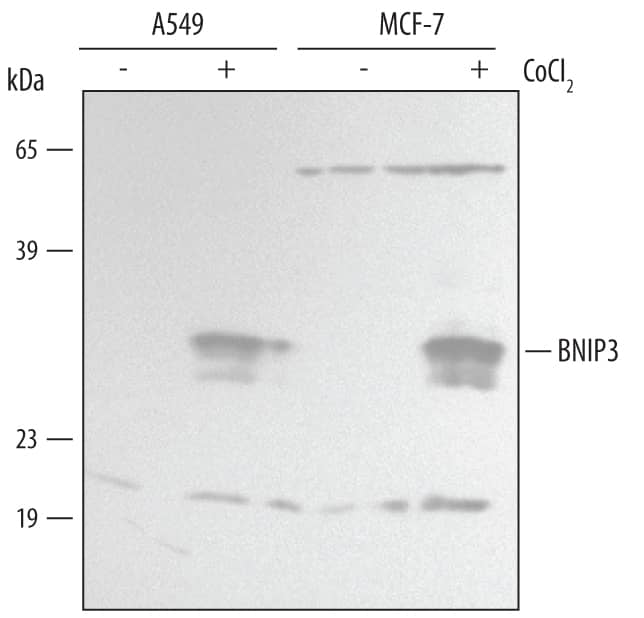Human BNIP3 Antibody
R&D Systems, part of Bio-Techne | Catalog # AF4147

Key Product Details
Validated by
Species Reactivity
Validated:
Cited:
Applications
Validated:
Cited:
Label
Antibody Source
Product Specifications
Immunogen
Ser2-Glu160
Accession # Q12983
Specificity
Clonality
Host
Isotype
Scientific Data Images for Human BNIP3 Antibody
Detection of Human BNIP3 by Western Blot.
Western blot shows lysates of A549 human lung carcinoma cell line and MCF-7 human breast cancer cell line untreated (-) or treated (+) with 150 µM CoCl2for 16 hours. PVDF membrane was probed with 1 µg/mL of Human BNIP3 Antigen Affinity-purified Polyclonal Antibody (Catalog # AF4147), followed by HRP-conjugated Anti-Goat IgG Secondary Antibody (Catalog # HAF109). A specific band was detected for BNIP3 at approximately 30 kDa (as indicated). This experiment was conducted under reducing conditions and using Immunoblot Buffer Group 2.Applications for Human BNIP3 Antibody
Western Blot
Sample: CoCl2-treated A549 human lung carcinoma cell line and MCF-7 human breast cancer cell line
Formulation, Preparation, and Storage
Purification
Reconstitution
Formulation
Shipping
Stability & Storage
- 12 months from date of receipt, -20 to -70 °C as supplied.
- 1 month, 2 to 8 °C under sterile conditions after reconstitution.
- 6 months, -20 to -70 °C under sterile conditions after reconstitution.
Background: BNIP3
Bcl-2/adenovirus E1B 19 kDa protein-interacting protein 3 (BNIP3), also known as 19 kDa interacting protein 3 (NIP3), is a proapoptotic member of Bcl-2 protein family. BNIP3 is a 194 amino acid, 21.5 kDa (predicted) protein that contains a single Bcl-2 homology 3 (BH3) domain and a C-terminal transmembrane domain required for mitochondrial localization, homodimerization, and regulation of its proapoptotic function. BNIP3 was identified as one of several proteins that interact with discrete domains of Bcl-2 and the E1B 19 kDa protein. Under conditions of prolonged oxygen deprivation, the hypoxia-induced protein HIF1-alpha activates expression of BNIP3, which in turn, promotes apoptosis under these conditions. The mechanism of BNIP3-mediated apoptosis is independent of caspase activation and cytochrome c release and is characterized by early plasma membrane and mitochondrial damage, prior to the appearance of chromatin condensation or DNA fragmentation. Human BNIP3 shares 90% amino acid identity with mouse and rat BNIP3. Human BNIP3 shares 56% amino acid sequence identity with human BNIP3L.
Long Name
Alternate Names
Gene Symbol
UniProt
Additional BNIP3 Products
Product Documents for Human BNIP3 Antibody
Product Specific Notices for Human BNIP3 Antibody
For research use only
